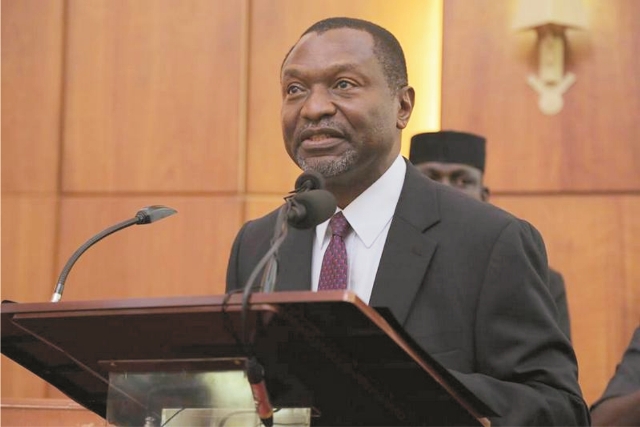Business
Minister Tasks China On Nigeria’s Agric Exports Tariff

The Minister of Budget
and National Planning, Sen. Udoma Udo Udoma, has urged China to reduce the five per cent tariff placed on Nigeria’s agricultural exports to that country.
Udoma said this at the 6th Session of the Economic Trade and Technical Cooperation Joint Commission held between Nigeria and China recently in Abuja.
According to him, the reduction will help narrow the trade imbalance between the two countries and encourage the export of agricultural products from Nigeria to China.
“There is therefore a need for mutual efforts to bridge the trade imbalance between the two countries.
“I am pleased to inform you that the Nigerian private sector is gearing up to participate in business opportunities in China and to tap on the current efforts of government to increase exports to China so as to bridge the current trade imbalance.
“In this regard, I wish to call on the Chinese Government to reduce the tariff on agriculture exports from Nigeria, which currently stands at five per cent.
“A reduction in tariffs will contribute to narrowing the trade imbalance between the two countries as it would encourage more exports to China from Nigeria.
“The current trade between the two countries averaged 5.9billion US dollars in the last five years.’’
Udoma explained that the session came on the heels of President Muhammadu Buhari’s visit to China, which stood as a landmark event in the annals of the bilateral relationship between the two countries.
He said the visit resulted in the two countries signing six cooperation agreements.
He recalled that the fifth joint commission session, which took place in Beijing, centered on a number of investment areas and financial aid among which was a 2.5 billion dollars loan extended to Nigeria.
He said, “500million dollars of this was on concessionary basis, an oil block concession was granted to the Chinese Government and a banking cooperation agreement.’’
The minister said the volume of trade between the two countries rose from 6.37 billion dollars in 2009 to 14.94 billion dollars in 2015 due to China’s increased investment in a number of sectors.
Udoma said the 6th Session aimed at further strengthening the bilateral cooperation between the two countries.
“Accordingly, Exchange of Notes on feasibility study for three projects, Second Phase of Solar Powered Traffic Control Signal, Abuja, Agriculture Demonstration Centre and 2016 Bilateral Training Programmes will be signed,’’ he said.
He reiterated that the sixth Ministerial Conference of the Forum of China-African Cooperation (FOCAC) in Dec. 2015 had a positive impact on the relationship between both countries.
According to him, the conference identified industrialisation, agricultural modernisation, infrastructure development, financial cooperation, trade and investment facilitation and green development as critical areas of cooperation.
Transport
Nigeria Rates 7th For Visa Application To France —–Schengen Visa

Transport
West Zone Aviation: Adibade Olaleye Sets For NANTA President

Business
Sugar Tax ‘ll Threaten Manufacturing Sector, Says CPPE

In a statement, the Chief Executive Officer, CPPE, Muda Yusuf, said while public health concerns such as diabetes and cardiovascular diseases deserve attention, imposing an additional sugar-specific tax was economically risky and poorly suited to Nigeria’s current realities of high inflation, weak consumer purchasing power and rising production costs.
According to him, manufacturers in the non-alcoholic beverage segment are already facing heavy fiscal and cost pressures.
“The proposition of a sugar-specific tax is misplaced, economically risky, and weakly supported by empirical evidence, especially when viewed against Nigeria’s prevailing structural and macroeconomic realities.
The CPPE boss noted that retail prices of many non-alcoholic beverages have risen by about 50 per cent over the past two years, even without the introduction of new taxes, further squeezing consumers.
Yusuf further expressed reservation on the effectiveness of sugar taxes in addressing the root causes of non-communicable diseases in Nigeria.
-

 News2 days ago
News2 days agoDon Lauds RSG, NECA On Job Fair
-

 Niger Delta15 hours ago
Niger Delta15 hours agoPDP Declares Edo Airline’s Plan As Misplaced Priority
-

 Transport18 hours ago
Transport18 hours agoNigeria Rates 7th For Visa Application To France —–Schengen Visa
-

 Nation16 hours ago
Nation16 hours agoHoS Hails Fubara Over Provision of Accommodation for Permanent Secretaries
-

 Sports16 hours ago
Sports16 hours agoSimba open Nwabali talks
-
Niger Delta17 hours ago
Stakeholders Task INC Aspirants On Dev … As ELECO Promises Transparent, Credible Polls
-
Niger Delta15 hours ago
Students Protest Non-indigene Appointment As Rector in C’River
-

 Oil & Energy17 hours ago
Oil & Energy17 hours agoElectricity Consumers Laud Aba Power for Exceeding 2025 Meter Rollout Target

